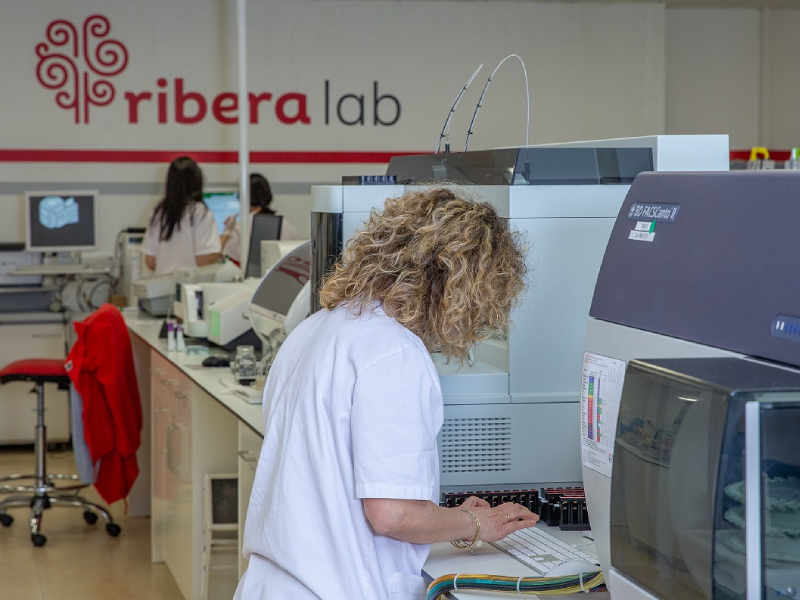
by mgisbert | Jun 27, 2024 | Ribera |
- The laboratory division of the Ribera health group participates as a speaker at the training day on glycated haemoglobin (HbA1C) in Serbia in Barcelona, with attendees from clinical laboratories throughout Spain.
- Findings from healthy patients carrying haemoglobin variants are important, especially in the case of patients of childbearing age, to avoid severe haematological disorders in the offspring.
Ribera Lab has become a benchmark laboratory in Spain due to its extensive experience in one of the techniques for the diagnosis of diabetes, specifically, the one based on the determination of glycated haemoglobin (HbA1c) by capillary electrophoresis. “The determination of HbA1c is very useful in the diagnosis and monitoring of diabetes mellitus. At Riberalab, the technique of choice for its analysis is based on capillary electrophoresis, which offers several advantages over other techniques currently available, such as the detection of healthy patients carrying haemoglobin variants,” explains Lara Hernando, technical director of the laboratory division of the Ribera healthcare group.
Lara Hernando, Ribera Lab’s national technical director, recently attended a training day on glycated haemoglobin (HbA1C) at Sebia in Barcelona as a speaker, with a session prepared together with Raquel López, technical director of Ribera Lab’s central laboratory, in which attendees from clinical laboratories from all over Spain participated, as Ribera Lab is one of the largest laboratories in Spain working with this technique.
“The chance findings, thanks to this technique, of healthy patients carrying haemoglobin variants are important, especially in the case of patients of childbearing age, especially because it is recommended that the same test be performed on their partners to rule out the presence of the same variant and thus prevent their offspring from having serious haematological disorders,” explains Lara Hernando.
In addition, as Ribera Lab’s technical director explains, the capillary electrophoresis determination of glycated haemoglobin allows alerting of potentially interfered or “unreliable” values of this substance, due to the presence of these variants. “In this way, the healthcare professional who has requested the test can evaluate the results obtained for a more specific diagnosis or an exhaustive follow-up of the patient, in order to make treatment decisions in the most accurate clinical context possible.
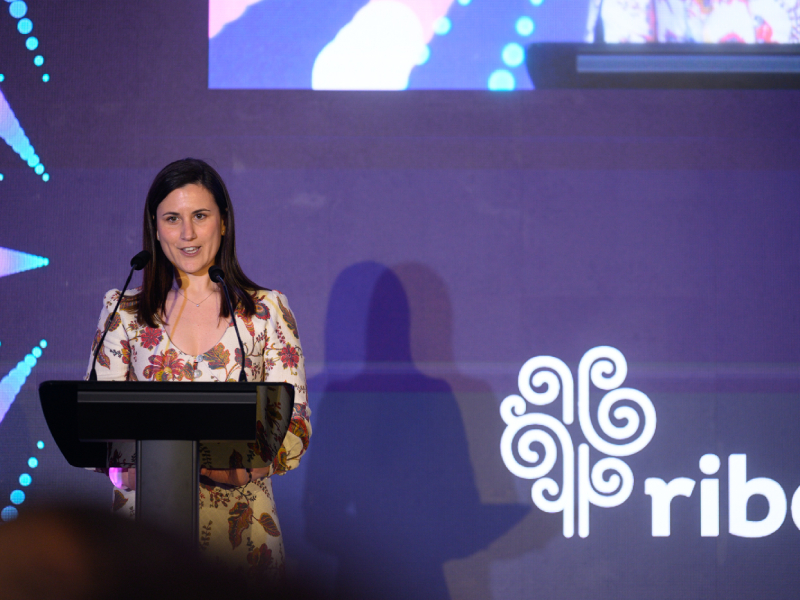
by mgisbert | Jun 6, 2024 | Ribera |
- The voice and Artificial Intelligence technology that is enabling continuous and personalised monitoring of patients, detecting health risks in advance and increasing the care capacity of professionals is recognised.
The Mediterranean Marketing Club’s MIA awards have judged that the best innovation project presented in this year’s edition was the patient monitoring programme with the virtual caregiver promoted by the Ribera healthcare group, known as Lola. Recognition was given not only for the originality of the voice technology, combined with Artificial Intelligence, but also for the great acceptance among patients and their families, and the protocol developed by the professionals for the remote monitoring of the patients’ health status.
The Ribera Group’s programme for remote patient monitoring, which includes the virtual caregiver Lola, developed in collaboration with the startup Tucuvi, is a technology that allows remote monitoring and control of thousands of patients with various pathologies related to respiratory problems, such as COPD, as well as palliative patients, whether oncological or not, at Ribera hospitals. Lola is a platform that, through voice technology, is capable of making multiple calls in a short interval of time, without the patient needing advanced devices, beyond a telephone. This virtual caregiver collects and processes all the information provided by the patient, to whom she asks the appropriate questions, thanks to Artificial Intelligence. For the programme, protocols have been developed with healthcare professionals so that, in the event of decompensation of the patient’s vital signs or a worsening of their state of health, an alert is issued so that a healthcare professional can immediately contact the patient. This anticipates risks for the patient and increases the capacity of healthcare professionals to care for more patients with the highest quality.
Esther Aucejo, digital manager of the Ribera group, was in charge of collecting the award yesterday and thanked for the recognition at a gala event held at the Huerto de Santa María (El Puig-Valencia), which was also attended by the group’s director of Communication, Marketing and CSR, Angélica Alarcón, the deputy director of the same area, Davinia Guilló, the group’s head of Social Media, Alba Martínez, and the head of Communication and Marketing of Ribera IMSKE, Alejandro Aznar.
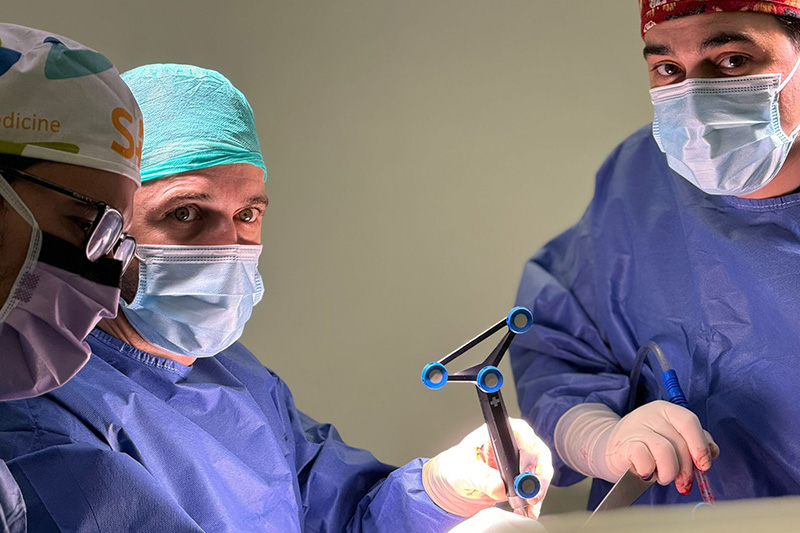
by S0p0rt3 | Jun 4, 2024 | Ribera |
- Ribera is committed to innovation in traumatology with the acquisition of a robot that allows personalised surgery with greater precision.
- No other hospital in the province of Alicante has this technology for Orthopaedic Surgery and Traumatology, which is performed in only a few centres in Spain.
- This programme digitally reconstructs the patient’s knee to provide the surgical team with real-time information on the patient’s anatomy.
The Hospital Universitario del Vinalopó, managed by the Ribera health group, has incorporated robotic surgery in the Orthopaedic Surgery and Traumatology service to implant knee prostheses more precisely, thereby reducing tissue damage. This is the first centre in the province of Alicante to develop this technique in traumatology, which is carried out in only a few hospitals in Spain due to its high level of specialisation. Ribera has opted for this technology that can verify in the same surgical act that the position of the implants is as perfect as possible. This advance means less postoperative pain for the patient, less surgical time, better recovery and greater durability of the implant.
The team of surgeons who have carried out the first interventions, formed by doctors Paulino Sanchez, Emilio Bascuñana and David Fernández, from the Reconstructive Joint Surgery Unit of the Orthopaedic Surgery and Traumatology Service, assures that the application of this technology provides a great leap in quality in the implantation of knee prostheses, since the precision in the placement of the implant is directly related to better mobility, less pain and greater durability. “The assistance of the robot provides us with real-time information to improve the precision of our gestures during surgery,” says Dr. Sánchez.
Robotic-assisted surgery, which has been widely developed over the last few years, represents a turning point in orthopaedic and prosthetic surgery as we know it today, and has become one of the major advances in this field of surgery and medicine in our country.
Innovative technology
This new technique is based on intraoperative navigation technology widely applied in other specialties such as neurosurgery, in this case using specific software for knee prosthesis implants. This programme digitally reconstructs the patient’s knee to provide the surgical team with real-time information on the patient’s anatomy and makes it possible to plan the exact model, size and position of the definitive implant, all digitally as the operation is being performed, thus avoiding having to carry out the different implant adjustment tests that are carried out in traditional techniques. It also allows high-precision automated bone resections, which reduces to a minimum any possible variation between the planned and the final placement of the real implant.
Early recovery and increased durability
Thanks to this technique, patients who have undergone surgery at the Vinalopó University Hospital for a knee prosthesis assisted by robotic navigation have been able to walk with aids on the same day of the operation, thus greatly shortening the recovery period. What’s more, all of them were discharged from hospital without complications within 24 hours. “Reducing tissue damage during surgery is key to avoiding bleeding, pain and making the patient’s recovery much faster and more pleasant, and patients notice this,” explains Dr Bascuñana.
Three-dimensional reconstruction technology using the robotic navigation system helps to reduce tissue injury by allowing only the necessary surgical gestures to be performed and avoids most of the intermediate steps of conventional techniques for implant selection and positioning.
With this system, it is possible to know in advance what the best position will be and to carry out digital dynamic tests to assess how it will behave in the future. All this results in the final implant being placed in the best possible position for the most accurate functioning, which extends the durability of the prosthesis and thus patient satisfaction. “Robotic navigation has meant that we have more information and more precision during surgery. We can now place prostheses that are completely customised for each patient,” Dr Fernández explained.
Customised prostheses
The planning of this state-of-the-art system goes beyond current systems as it not only provides precision to the surgeon, but also allows the definitive implant to be planned based on the type and shape of the patient’s bone, as well as being able to assess the tension of the knee ligaments, a fact that until now had not been possible to evaluate with other planning systems. This allows greater personalisation of the surgery as the implant can be perfectly adjusted to the bone, as well as maintaining the patient’s ligamentous anatomy perfectly intact, thus ensuring that the functioning of the implant is truly balanced, providing greater stability and less discomfort.
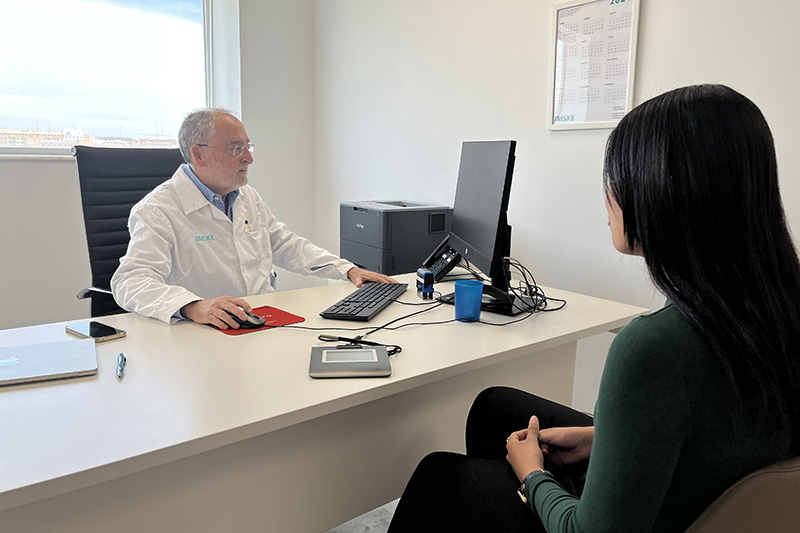
by S0p0rt3 | Jun 4, 2024 | Ribera |
- In the context of World Fibromyalgia Day, specialists remind us that this pathology “generates added suffering for patients, due to the social misunderstanding that is added to the pain, chronic fatigue or sleep problems, among other symptoms they suffer and which can be very disabling”.
- Dr. Palop, who has treated more than 12,000 affected women throughout Spain, has participated in the monographic review of the fibromyalgia disease and the Fisterra Guide and highlights the value of “personalised attention to patients”.
The Ribera IMSKE hospital, the centre specialising in the locomotor system of the Ribera healthcare group, has activated its Fibromyalgia Unit with the incorporation of Dr. Vicente Palop as coordinator of the area, together with Dr. Patricia Roth. Both professionals have extensive experience in the treatment of this syndrome and have been working together for years, forming a professional tandem of recognised prestige in the field of fibromyalgia. Several professionals from Ribera IMSKE have also joined this unit to form a large multidisciplinary team that approaches this disease from all angles: physiotherapy, hydrotherapy, pain, nutrition and rheumatology. This unit also includes Arturo Aleis, nutritionist, and the physiotherapy team made up of Pablo Martínez, Jordi Llopis, and Mariano Soler, who join doctors Palop and Roth in this project, which opens on 8 May, just a few days before the commemoration of World Fibromyalgia Day.
Dr. Palop is a professional with almost 30 years of experience in the treatment of what he defines as “a complex syndrome, which generates added suffering for patients due to the social misunderstanding that is added to the pain, chronic fatigue or sleep problems, among other symptoms they suffer and which can be very disabling”. She has treated more than 12,000 women throughout Spain and has participated in the monographic review of The fibromyalgia disease and the Fisterra Guide on this syndrome, both documents that are considered a reference at a national level and also in South America for the approach to this pathology.
It is estimated that there are around 900,000 people in Spain with fibromyalgia, an ailment that particularly affects women between the ages of 30 and 60, but is also diagnosed in younger people and men. However, according to the National Institute of Statistics, only around 276,000 patients have been diagnosed.
And it is precisely the complexity of this syndrome that makes it difficult to diagnose. Dr Palop explains that patients “have symptoms in different organs, which affects their mood, generates anxiety and even causes cognitive deterioration. “Often, a person with chronic pain does not sleep and is not even able to remember what they have done one day or who they have been with,” explains the fibromyalgia specialist at the Ribera IMSKE hospital.
Dr. Palop explains that at the Fibromyalgia Unit of the Ribera IMSKE hospital, patients undergo a complete assessment and a test to find out exactly what their symptoms are. And then “a personalised and comprehensive approach to treatment is proposed, which may include different specialities, always under the supervision of this specialised unit”. “It is important to remember that these patients have pain without an injury, such as a fracture. But it is fundamentally muscular and tendon pain, which they suffer 24 hours a day, and which has a significant impact on their state of mind, causing anxiety and depression in many cases,” she says, confirming the importance of a comprehensive and multidisciplinary approach.
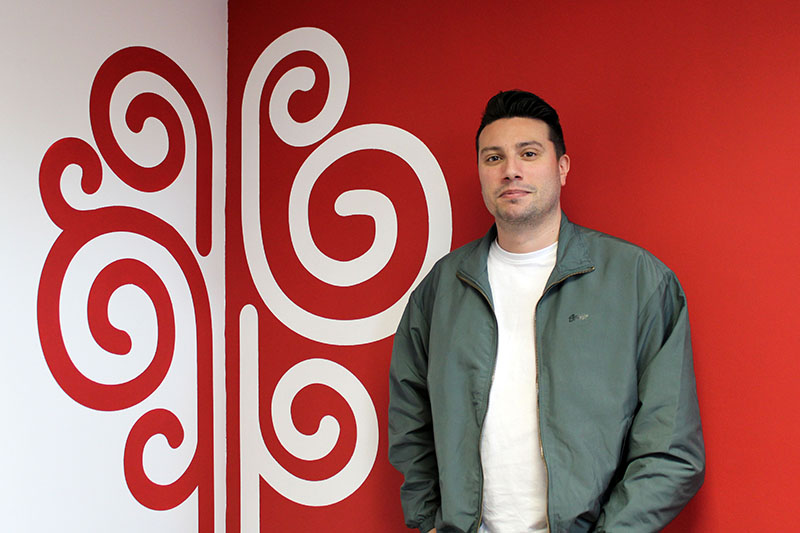
by S0p0rt3 | Jun 4, 2024 | Ribera |
- In the context of World Book Day, Ribera hospitals will decorate some rooms with original texts by this author and influencer, inspired by the importance and value of the care that healthcare professionals provide to patients and their families.
- In addition, five social media posts are planned and bookmarks will be distributed to patients and professionals with their inspirational quotes.
The Ribera healthcare group and the writer Jose Ángel Gómez Iglesias, better known as Defreds, have launched a special collaboration in which the writer from Vigo has created several inspiring texts with which he raises awareness of the importance of care. This campaign, which is launched in the context of Book Day, reinforces the value of literature and writing as therapeutic support, as well as supporting the responsible health model promoted by the Ribera healthcare group for the care of its patients, with special attention to the professionalism of its healthcare workers, humanisation and care.
The collaboration between the Ribera group and Defreds involves the publication of five publications on social networks, which began on Wednesday 24 April with the phrase “The hug that makes you feel at home. The texts created by Defreds for the Ribera Povisa hospital emphasise the value of care, hope, optimism and support, but as usual in the phrases proposed by the Galician creator, they are open to multiple interpretations depending on the sensitivity of the reader or his or her personal life moment.
The collaboration project has transcended the social networks with different media in Ribera hospitals. On the one hand, the phrases created by Defreds have been reproduced on a physical medium and can now be read in different areas of the group’s health centres, such as waiting rooms, extractions, dialysis units and the day hospital.
In addition, on the occasion of Book Day on 23 April, the Ribera hospitals have distributed bookmarks, in which one of Defreds’ phrases is reproduced, among the patients and professionals in each centre to reinforce the campaign.
The collaboration with Jose Ángel Gómez reinforces the Ribera health group’s commitment to creativity, to add value to its brand, as well as its intention to reach a greater number of people, including young people, and thus contribute to raising awareness of the importance of resorting to official health sources to access reliable health information, from authoritative voices with specialised training.
Recently, the Ribera health group has also collaborated with the designer 72 kilos on the occasion of Health Day, and last year it launched the Rhythms of Life campaign, which combines music and cardiovascular health, and which has already received several awards and distinctions.
Mobile libraries in hospitals, poetry reading and storytelling
The Ribera hospitals have organised a multitude of activities in the context of Book Day, such as the storytelling day at the University Hospital of Torrejón or the poetry recital, accompanied by music, which took place at the University Hospital of Vinalopó. The Cascais Hospital (Portugal), for its part, organised a special day as part of its collaboration with an association of volunteers who read books to children in hospital.
In addition, the university hospitals of Vinalopó (Elche) and Torrejón, the Ribera Povisa hospital (Vigo) and Ribera Hospital de Molina have mobile library services to provide their patients with access to readings that help to improve their physical and emotional well-being, as well as to make their waiting time or admission to day hospital, hospitalisation or dialysis, among others, more pleasant. They also have several fixed points, small libraries, in services such as paediatrics and waiting rooms, psychiatric hospitalisation and emergency observation, among others, depending on the health centre.
Vinalopó and Torrejón launched the initiative based on the donation of books by the professionals of the health centre itself, while in the case of Ribera Hospital de Molina, the project was made possible thanks to the donation of funds from the Municipal Library Network of Molina de Segura.
Video collaboration Defreds Video: https://www.instagram.com/p/C6LhNAviKT9/






Recent Comments